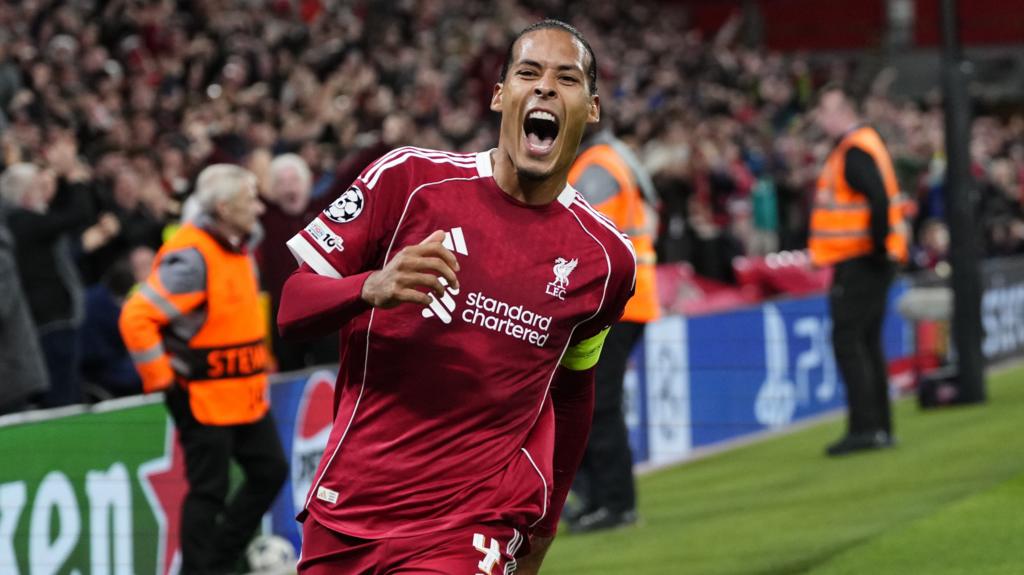Liverpool’s Champions League Late Wins: Concerning Trend or Proof of Mentality?
Liverpool Football Club has always thrived on drama. From historic European nights at Anfield to last-minute winners that have defined their identity, the Reds are no strangers to footballing theatre. In the 2025 Champions League campaign, however, Liverpool’s frequent reliance on late goals to secure victories has sparked debate among fans, pundits, and former players.
Are these last-gasp wins a warning sign of deeper problems—perhaps tactical issues, missed chances, or defensive lapses? Or are they instead the clearest proof yet of Liverpool’s winning mentality, resilience, and refusal to give up until the final whistle?
This article takes a deep dive into Liverpool’s Champions League performances, analyzing match patterns, fan reactions, managerial tactics, and what these dramatic late victories say about the club’s mentality in Europe.
The Pattern of Late Wins
In the group stage and early knockout rounds, Liverpool’s story has been consistent: tight matches decided in the dying minutes.
Against Napoli at Anfield, a 1-1 draw seemed certain until Darwin Núñez struck in stoppage time.
Away to Porto, a sluggish performance turned triumphant with a 90th-minute Cody Gakpo winner.
Versus RB Leipzig, Mohamed Salah converted a penalty in the 88th minute to secure qualification.
These games illustrate a trend: Liverpool are not dominating matches for 90 minutes but instead finding ways to win when it matters most.
The Case for Concern
While late winners thrill fans, some see them as a symptom of problems lurking beneath the surface.
1. Struggles to Control Games
Liverpool, under Jürgen Klopp’s system, are known for high-intensity pressing and quick transitions. Yet in Europe this season, they have often looked sluggish in midfield, failing to dictate tempo for long spells. Opponents exploit spaces, and Liverpool end up chasing games rather than controlling them.
2. Wastefulness in Attack
The front line—Salah, Núñez, Gakpo, and Luis Díaz—creates chances but often fails to convert them. Missed opportunities leave matches open until the final minutes, forcing Liverpool to rely on clutch goals.
3. Defensive Vulnerabilities
Liverpool’s backline has leaked goals at crucial moments. While Virgil van Dijk remains a leader, lapses in concentration and inconsistent performances from full-backs have added pressure late in games.
4. Unsustainable Trend
Winning through last-minute goals is exhilarating but risky. Over the course of a tournament, constant reliance on late drama may backfire against elite opposition like Real Madrid, Bayern Munich, or Manchester City.
The Case for Mentality
On the other hand, many argue that Liverpool’s late winners are a hallmark of elite mentality, not weakness.
1. The Never-Say-Die Spirit
Liverpool’s history is defined by comebacks—think Istanbul 2005, Barcelona 2019, and countless domestic thrillers. Late goals are part of their DNA, reflecting belief and resilience.
2. Squad Depth Making the Difference
Substitutions have often been decisive. Klopp’s use of bench strength—bringing on Diogo Jota, Harvey Elliott, or young midfielders—has added energy in the final stages, overwhelming tired opponents.
3. Champions League Heritage
Liverpool’s European nights are psychologically unique. Few teams embody “mentality monsters,” a phrase Klopp himself coined, better than Liverpool in high-pressure Champions League situations.
4. Tactical Patience
Rather than panicking, Liverpool often stick to their plan, wearing down teams until the final minutes. The late goals reflect patience and execution, not desperation.
Voices from the Dressing Room
Players and coaching staff have been quick to defend the trend:
Jürgen Klopp insists late goals show the team’s character: “You can’t plan for the 90th-minute winner, but you can create the conditions for it—intensity, belief, and structure.”
Virgil van Dijk highlighted mentality: “We never feel beaten. That’s what makes us Liverpool.”
Salah framed it positively: “As long as we score, it doesn’t matter when.”
This rhetoric feeds into the idea that late winners are a strength, not a weakness.
Fan Reactions
Among supporters, opinions are split.
Optimists see it as thrilling proof of Liverpool’s fighting spirit. Social media is full of phrases like “mentality monsters are back” whenever a stoppage-time goal is scored.
Skeptics warn against complacency, pointing out that constant reliance on miracles could spell disaster against better opposition. Some worry Liverpool’s style may be too one-dimensional or predictable.
Neutral fans simply enjoy the drama, with Liverpool once again providing some of the most entertaining matches of the Champions League season.
Pundit Analysis
Pundits across Europe have chimed in:
Gary Neville (Sky Sports) has argued Liverpool’s late goals expose earlier failings: “If you need a 90th-minute strike every week, something’s not right tactically.”
Rio Ferdinand counters, saying: “That’s mentality. The best teams win ugly, and Liverpool are showing that.”
European analysts on ESPN highlight Liverpool’s pressing drop-off compared to peak Klopp years, suggesting that late wins might paper over cracks.
Statistical Context
Looking at Champions League history, teams that rely on late goals often become tournament favorites. For instance:
Real Madrid’s 2014 and 2022 campaigns were full of late winners.
Manchester United’s 1999 treble hinged on two stoppage-time goals in the final.
Liverpool’s late wins may therefore put them in elite company.
Klopp’s Tactical Evolution
Another angle is Klopp’s evolving style. In earlier years, Liverpool blew teams away early. Now, with a maturing squad, Klopp’s approach seems more pragmatic: controlling intensity, rotating heavily, and trusting depth to deliver in the final minutes.
This shift may explain why late goals are more common—they are part of the plan, not a coincidence.
Psychological Warfare
Opponents now enter matches knowing Liverpool are dangerous until the last second. This psychological pressure makes teams drop deeper, concede possession, and invite late drama. In effect, Liverpool’s reputation becomes a weapon.
Comparison with Rivals
Comparing Liverpool with Europe’s elite:
Real Madrid also thrive on late drama, especially with Vinícius Jr. and Jude Bellingham producing clutch moments.
Bayern Munich tend to kill games early through dominance.
Manchester City rely on controlled possession, making late chaos less common.
Liverpool’s reliance on late goals sets them apart stylistically but could also be exploited by opponents who remain composed.
The Risk of Burnout
One legitimate concern is physical and emotional exhaustion. Constantly playing at high intensity until the last second could leave players drained, especially as the season progresses into knockout rounds and domestic competition heats up. Injuries to key figures could also expose reliance on late drama as unsustainable.
The Romance of Liverpool in Europe
Beyond tactics, Liverpool’s relationship with the Champions League is almost mystical. Fans around the world expect drama when the Reds are involved. Late winners feel like a continuation of a tradition that spans decades.
Whether concerning or inspiring, these moments enhance the mythology of Liverpool Football Club.
Conclusion: Concern or Mentality?
So, what do Liverpool’s late Champions League wins really mean? The truth lies somewhere in the middle.
Yes, there are concerns: struggles in controlling games, defensive vulnerabilities, and reliance on chaotic endings.
But equally, there is proof of mentality: resilience, tactical patience, and the ability to deliver when it matters most.
Ultimately, football is about results. And in Europe, results are often decided by moments of brilliance, belief, and resilience in the final minutes. If Liverpool can harness this trend without becoming dependent on it, their late winners could be remembered not as warning signs but as the hallmark of another iconic Champions League run.
http://Liverpool Champions League late wins reaction mentality



